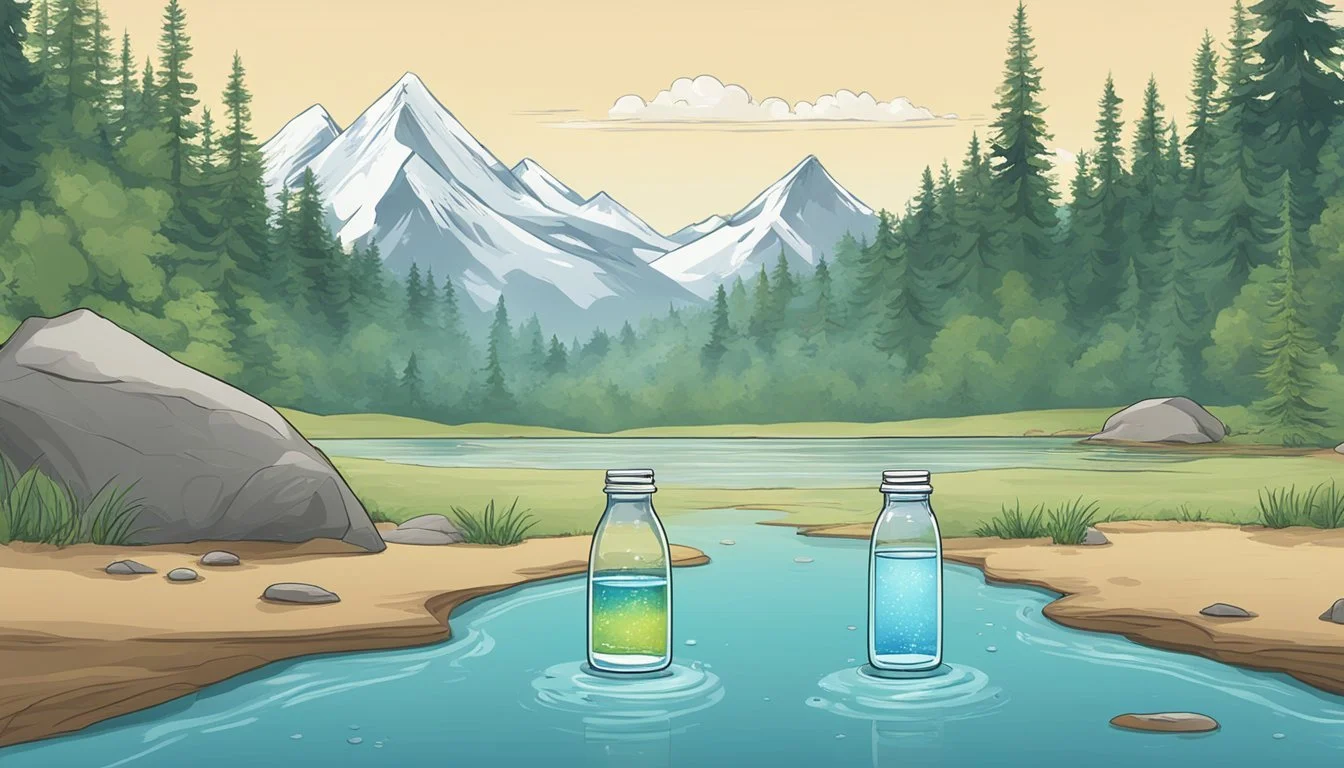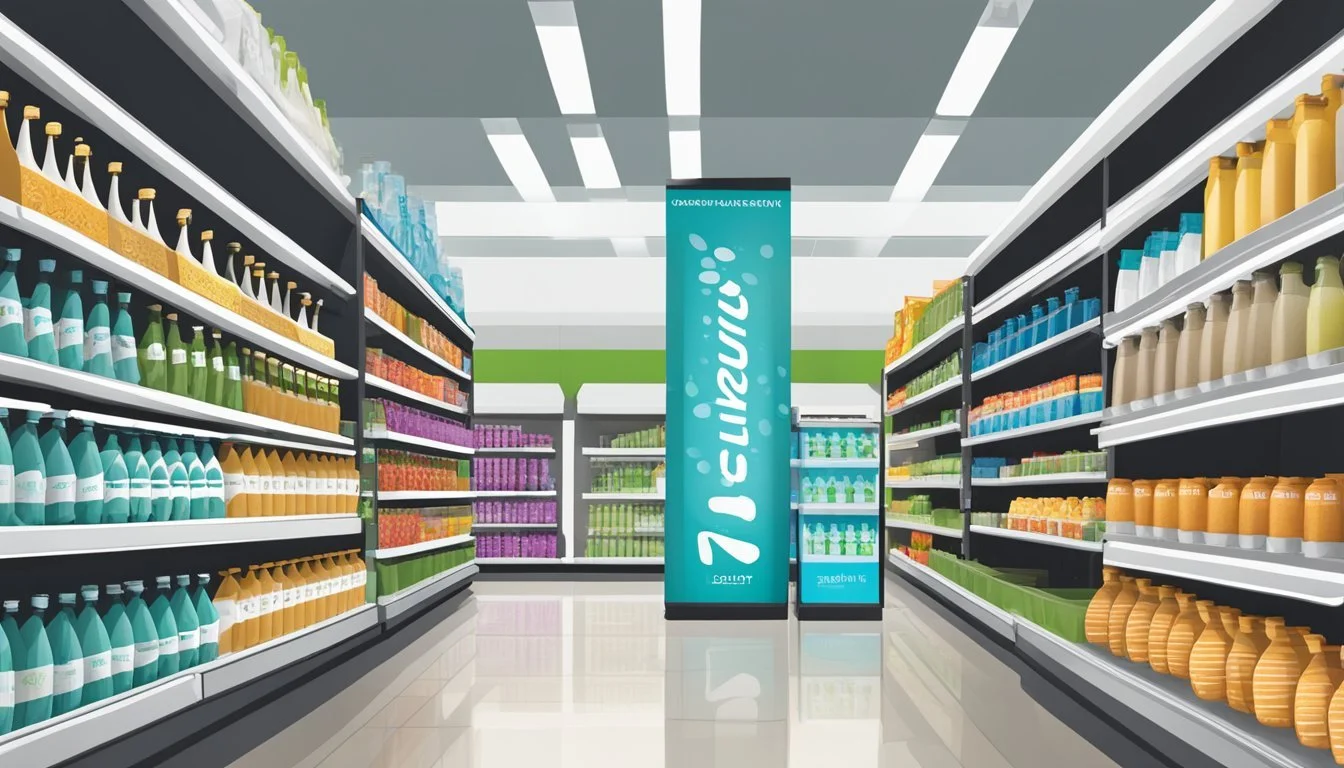Just Water vs. Zenwtr
Comparing Bottled Water Options
Choosing the best bottled water can be a surprisingly nuanced decision for anyone prioritizing both health and environmental responsibility. Just Water and ZenWTR are two prominent brands with both claiming to offer superior hydration and sustainability. While Just Water emphasizes its eco-friendly packaging made from paper and sugarcane-based materials, ZenWTR stands out for its premium alkaline water with a pH of 9.5 and its commitment to using recycled ocean-bound plastic.
Just Water strives to reduce the industry's reliance on petroleum-based plastics, presenting an option that's as thoughtful about the planet as it is about providing clean, crisp hydration. In contrast, ZenWTR distinguishes itself not only through its high-quality alkaline water but also via its innovative use of recycled plastics, targeting the reduction of ocean pollution.
For those who prioritize environmental sustainability and are health-conscious, the differences between Just Water and ZenWTR offer distinct advantages. Depending on your specific values—eco-friendly packaging versus premium water quality and recycling efforts—either Just Water or ZenWTR might be the better choice for quenching your thirst.
Understanding Bottled Water
Bottled water comes in various types, each offering unique benefits. Important factors include the presence of minerals and electrolytes, which can affect health and taste, and the purification processes that ensure safety and quality.
Types of Bottled Water
There are several types of bottled water available:
Mineral Water: Contains naturally occurring minerals.
Spring Water: Sourced from underground formations and flows naturally to the surface.
Purified Water: Undergoes various purification processes.
Alkaline Water: Has a higher pH level, often through ionization.
Artesian Water: Comes from a confined aquifer.
Each type offers different benefits, from enhanced taste to potential health advantages.
The Role of Minerals and Electrolytes
Minerals and electrolytes in bottled water include magnesium, calcium, and potassium.
Magnesium: Supports muscle and nerve function.
Calcium: Essential for bones and teeth.
Potassium: Helps maintain fluid balance.
Electrolytes are crucial for hydration, making water not just a simple beverage but a key part of maintaining bodily functions.
Purification Techniques
Purification processes ensure bottled water is safe to drink. Common techniques include:
Reverse Osmosis: Removes impurities using a semipermeable membrane.
Filtration: Uses various filters to remove particles and contaminants.
Vapor Distillation: Turns water into vapor before condensing it back to liquid form, leaving impurities behind.
These methods help provide clean, safe, and often better-tasting water, suitable for various preferences and needs.
Health and Hydration
When comparing Just Water and ZenWTR, understanding their impact on health and hydration is essential. Key factors include their pH levels and how effectively they support hydration and energy levels.
The pH Factor in Water
The pH level of water can impact how it interacts with the body. ZenWTR has a pH of 9.5, which makes it alkaline. Alkaline water is believed to help balance the body’s pH, potentially reducing acid levels and benefiting overall health.
In contrast, Just Water's pH details are not prominently highlighted. The pH can influence taste and how water interacts with stomach acid. High pH water like ZenWTR might offer different health benefits compared to more neutral pH water.
Hydration and Its Impact on Energy
Hydration is crucial for maintaining energy levels and overall well-being. ZenWTR aims to provide hydration with added benefits from its alkaline nature. Consumers might choose it for the perceived health advantages, such as potential detoxification.
Meanwhile, Just Water focuses on pure hydration, using sustainable plant-based packaging. The brand emphasizes good hydration practices without additional claims about energy enhancement. Both brands ultimately aim to hydrate effectively, though ZenWTR’s high pH might appeal to those seeking specific health benefits.
Just Water and ZenWTR Analysis
This section provides a detailed comparison of Just Water and ZenWTR, focusing on their brand profiles, taste, and price. The aim is to help readers make an informed choice between the two water brands.
Brand Profiles
Just Water is known for its eco-friendly packaging and emphasis on sustainability. Its bottles are made from 88% renewable materials, including a bio-plastic cap and a primarily paper-based design. The company is committed to reducing plastic waste and offers a low-carbon footprint alternative.
ZenWTR focuses on sustainability as well, using recycled ocean-bound plastic for its bottles. The brand aims to address plastic pollution directly by removing waste from the ocean. ZenWTR is also marketed as premium alkaline water with a pH of 9.5, making it appealing to health-conscious consumers.
Taste Comparison
When it comes to taste, Just Water offers a clean, crisp flavor that is derived from its natural spring sources. Consumers appreciate its neutral taste, which pairs well with various meals and activities. This water brand focuses on providing pure hydration without any distinct aftertaste.
ZenWTR, with its 9.5 pH level, provides an alkalizing effect that many customers find refreshing and smooth. Athletes and health enthusiasts tend to favor ZenWTR for its potential benefits, such as aiding in recovery and hydration. The elevated alkaline level sets it apart from standard bottled water like Smartwater and Core Hydration.
Price Consideration
Just Water tends to be more budget-friendly compared to premium brands. Its focus on accessibility and sustainability means that it is often priced lower, making it an attractive option for eco-conscious consumers on a budget.
ZenWTR, on the other hand, is positioned as a premium product. The use of recycled ocean-bound plastic and its 9.5 pH alkaline water contribute to a higher price point. Although it may be more expensive, many consumers are willing to pay for what they perceive as better quality and additional health benefits.
Environmental Impact
Both Just Water and ZenWTR prioritize sustainability, but they differ in their approaches to packaging, carbon footprints, and ocean conservation efforts.
Packaging and Sustainability
Just Water uses a combination of sustainable paper and recyclable plastic for its bottles. The primary material comes from sustainable forests, ensuring responsible sourcing. Only a small amount of plastic is used, mainly for the cap and waterproof lining.
ZenWTR, on the other hand, focuses on utilizing ocean-bound plastic. Their bottles are made from 100% recycled plastic, specifically collected to prevent it from entering oceans. This contributes to reducing plastic waste and promotes recycling.
Comparison at a glance:
Just Water: Sustainable paper, minimal plastic usage
ZenWTR: 100% recycled, ocean-bound plastic
Carbon Footprint Analysis
Just Water emphasizes reducing its carbon footprint through its production process. By sourcing materials responsibly and minimizing plastic, they lower the carbon emissions associated with the lifecycle of their product.
ZenWTR counters carbon emissions by contributing to plastic cleanup efforts. By focusing on recycling ocean-bound plastic, they indirectly reduce the environmental cost of producing new plastic. Transportation emissions are also mitigated by sourcing materials closer to production sites when possible.
Key notes:
Just Water: Lower emissions through minimal plastic
ZenWTR: Mitigates emissions by recycling ocean-bound plastic
Ocean Conservation Efforts
ZenWTR is deeply involved in ocean conservation. Their commitment to using ocean-bound plastic directly supports efforts to remove plastic waste from oceans. This helps protect marine ecosystems and reduces the environmental damage caused by plastic pollution.
Just Water contributes to conservation by using less plastic and promoting the use of renewable resources. Although their primary focus isn't on ocean conservation, their sustainable practices help lower the overall environmental burden.
Essential details:
ZenWTR: Direct impact through ocean-bound plastic usage
Just Water: Indirect benefits by reducing plastic usage overall
Socioeconomic Aspects
Examining the socioeconomic aspects of Just Water and ZenWTR involves looking at both the convenience of their offerings and the availability of subscription services to ensure customer accessibility.
Convenience of Bottled Water
Just Water: Just Water leverages a unique approach with its packaging, focusing on bio-plastic caps and a majority paper-based design. This makes it convenient for consumers invested in eco-friendly products. Its packaging also contributes to easier recycling, enhancing convenience for environmentally conscious users.
ZenWTR: ZenWTR, on the other hand, uses bottles made from 100% post-consumer recycled ocean-bound plastic. Available in over 4,000 stores in the U.S., including Whole Foods, ZenWTR maintains an impressive distribution network. This widespread availability makes it accessible and convenient for a broader audience looking for sustainable bottled water options.
Subscription Services and Accessibility
Just Water: Just Water offers subscription services that can be easily managed online, providing options for regular deliveries. This not only adds convenience but also saves time for busy consumers. The subscription service often includes discounts, making it a financially viable option for regular customers.
ZenWTR: While specific details on ZenWTR’s subscription services were not found in the search results, its extensive retail presence ensures high accessibility. Customers can likely find ZenWTR in nearby stores without the need for online subscriptions. This accessibility in physical stores supports convenience for those who may prefer in-person purchasing over online subscriptions.
Both brands offer unique benefits in terms of packaging and availability, catering to different consumer needs and preferences.
Alternatives and Innovations
Modern consumers are increasingly eco-conscious, seeking sustainable and innovative solutions to reduce plastic waste. Both plant-based bottles and reusable alternatives offer compelling options for environmentally responsible hydration.
Emergence of Plant-Based Bottles
Plant-based bottles are emerging as a significant innovation in the bottled water industry. These bottles are typically made from bioplastics derived from renewable sources like corn starch, sugarcane, or other plant materials. Just Water is an example of a brand utilizing plant-based cartons, which combine paper and plant-derived plastic.
Such materials are designed to reduce the environmental impact compared to traditional petroleum-based plastics. While they still face challenges related to biodegradability and recycling, plant-based bottles represent a step forward in minimizing carbon footprints and promoting sustainable packaging solutions.
Reusable Alternatives
Reusable alternatives like stainless steel, glass, and aluminum water bottles are popular among eco-conscious consumers. Stainless steel bottles are durable, often insulated, and can keep beverages hot or cold for extended periods. Glass bottles provide a chemical-free option that doesn't leach flavors but can be heavy and fragile.
Aluminum bottles offer a lightweight, recyclable choice, although they can sometimes impart a metallic taste. Brands like S'well, Hydro Flask, and Klean Kanteen have gained popularity in this market, promoting reusable options that are stylish and environmentally friendly.
Reusable water bottles help cut down on single-use plastic waste, encouraging sustainable habits. The choice between these materials depends on individual preferences relating to durability, weight, and taste.
More About Just Water
Core Hydration vs Just Water: Which Bottled Water is Better?
Icelandic Glacial vs Just Water: Which Bottled Water is Better?
Just Water vs Aqua Carpatica: Which Bottled Water is Better?
Just Water vs Cascade Mountain: Which Bottled Water is Better?
Just Water vs Crystal Geyser: Which Bottled Water is Better?
Just Water vs Hawaii Volcanic: Which Bottled Water is Better?
Just Water vs Hawaiian Springs: Which Bottled Water is Better?
Just Water vs Kirkland Signature: Which Bottled Water is Better?
Just Water vs Mountain Valley Spring Water: Which Bottled Water is Better?
Just Water vs Nestle Pure Life: Which Bottled Water is Better?
Just Water vs Richard's Rainwater: Which Bottled Water is Better?
Just Water vs San Pellegrino: Which Bottled Water is Better?
Just Water vs Solan de Cabras: Which Bottled Water is Better?
Just Water vs Talking Rain AQA: Which Bottled Water is Better?
Just Water vs Whole Foods 365: Which Bottled Water is Better?
Just Water vs Whole Foods Italian Still Mineral water: Which Bottled Water is Better?




